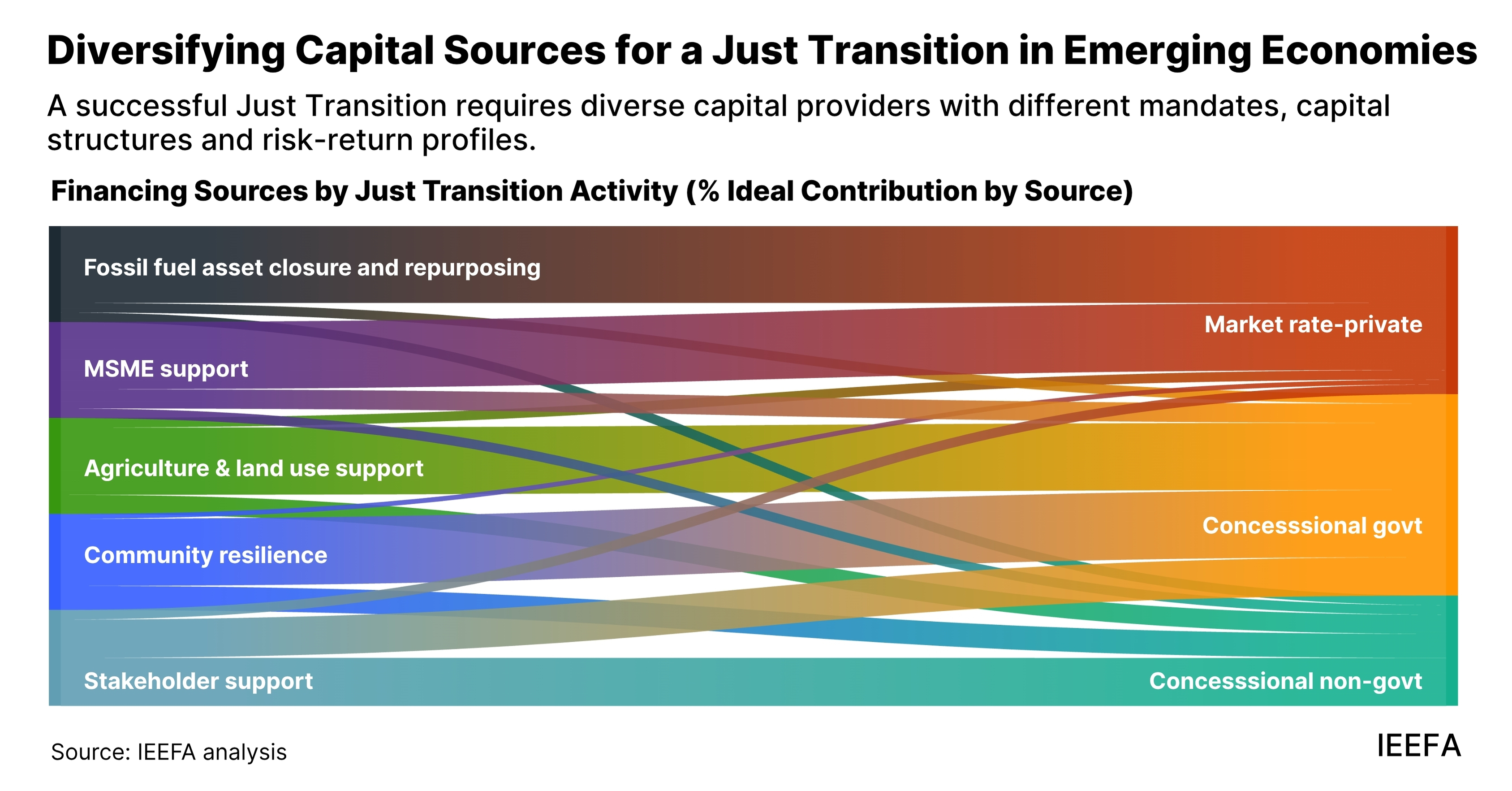How Targeted Co-Financing can Enable a Just Transition in Emerging Economies

Just Transition strategies must align with national decarbonisation goals, net-zero targets and Nationally Determined Contributions while being rooted in local development priorities.
Key Takeaways:
Supporting a Just Transition in emerging economies requires not only large-scale capital for infrastructure, such as renewables, but also targeted financing for communities and small businesses. Capital should be matched to specific activities based on risk and impact.
Detailed and strategic investment plans help build investor confidence by clearly mapping projects, funding needs and socio-economic co-benefits.
Blended finance structures are crucial to fund non-commercial activities, such as worker reskilling, while attracting private investment for infrastructure.
Strengthening institutional co-ordination across ministries, empowering sub-national governments and embedding robust governance systems are critical to ensure transparency, accountability and long-term effectiveness of Just Transition financing ecosystems.
13 June 2025 (IEEFA South Asia): Ensuring vulnerable workers and communities are not left behind is one of the biggest challenges emerging economies will face in their energy transition, but it also opens up new job opportunities and avenues for economic growth, states a new report released by the Institute for Energy Economics and Financial Analysis (IEEFA).
“Combining climate action with social equity can facilitate the energy transition in emerging markets and developing economies (EMDEs) without disrupting sectors that rely solely on fossil fuels,” says co-author Shantanu Srivastava, IEEFA’s research lead, sustainable finance and climate risk.
“A Just Transition aims to manage this change fairly by protecting affected workers and communities, creating opportunities for economic growth and ensuring the benefits of the transition are shared widely,” Srivastava notes.
While fossil fuel industries face the risk of stranded assets in an evolving energy landscape, large companies have the resources and access to capital to adapt. The greater risk for governments is that entire communities dependent on these operations will be left stranded by their closure.
The report emphasises the need for a “co-investment” approach for these asset closures, which combines financing energy transition assets like renewable energy with Just Transition activities, such as building community resilience or social support measures. These programmes often require concessional or grant-based finance.
“Just Transition activities encompass a mix of hard energy transition assets, such as renewable energy, climate smart agriculture, and climate-resilient infrastructure, and ‘softer’ Just Transition aspects like responsible coal asset closures, stakeholder capacity building, labour reskilling, support for micro, small and medium enterprises (MSMEs), and community resilience,” says co-author Soni Tiwari, energy finance analyst at IEEFA.
The report draws on case studies from India, the Philippines, Ethiopia and South Africa to highlight how strategically planned, targeted and co-ordinated interventions can prepare vulnerable communities for a low-carbon future. However, it also highlights the pitfalls of inadequate planning and community consultation.
- The Philippines’ Accelerating Coal Transition (ACT) investment plan shows how securing grant commitments early on to finance Just Transition aspects can help mobilise additional concessional and commercial capital to fund fossil fuel asset closure and repurposing.
- South Africa’s Just Energy Transition Investment Plan (JET-IP) underscores the importance of institutional co-ordination, strong governance frameworks, and dedicated funding platforms that facilitate connections between funders and project developers.
- In India, a targeted programme for MSMEs helped co-ordinate investment from domestic, multilateral and philanthropic institutions in policy reform, technical assistance and scalable clean energy solutions for MSMEs.
- Another programme in India that has been hugely successful – the Zero-Budget Natural Farming (ZBNF) – has shown how targeted investments in capacity building can create a self-sustaining and low-carbon business model for farmers in vulnerable communities.
- In Ethiopia, the United Nations Green Climate Fund (GCF) financed a rural water programme that illustrates the value of grant-based financing in fragile contexts, along with empowering local institutions to mainstream climate action and deliver on-the-ground results.
“With fiscal pressures mounting and fossil fuel revenues expected to decline, EMDE governments should look beyond their own budgets to a diverse set of capital providers, including multilateral development agencies, private investors, development banks and philanthropies,” Tiwari says.
“The financing challenge is not only about scale, but also about targeting suitable forms of capital for the right activities based on their risk-return profiles and developmental impact,” Srivastava emphasises.
By strengthening monitoring systems, aligning national schemes and fostering partnerships, EMDEs can access funding more easily and strive for a sustainable energy transition.
Read the analysis: Financing Just Transitions in Emerging Economies
Media contact: Prionka Jha, ![]() [email protected], ph +91 9818884854
[email protected], ph +91 9818884854
Author contact: Shantanu Srivastava ([email protected]), Soni Tiwari ([email protected])
About IEEFA: The Institute for Energy Economics and Financial Analysis (IEEFA) examines issues related to energy markets, trends and policies. The Institute’s mission is to accelerate the transition to a diverse, sustainable and profitable energy economy. (ieefa.org)














